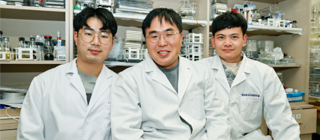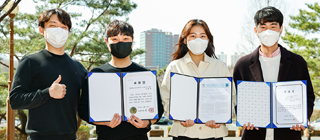-
Suggested alternative for overcoming antibody tolerance... Comparative analysis on pros and cons of plant-based antibody material production techniques Listed in internationally prominent journals, selected as ‘People Who Made Korea Shine’ of the BRIC (Biological Research Information Center) “Can be used for development of antibodies by biotechnology companies” [April 16, 2021] <From left to right: Department of Biotechnology Professor Pragya Tiwari, Professor Bae Han-hong> A paper on ‘plant-derived antibodies’ presented by YU Department of Biotechnology Professor Bae Han-hong (56) is drawing attention from academic circles both at home and abroad. This paper is titled ‘Plant synthetic biology for producing potent phyto-antimicrobials to combat antimicrobial resistance’ and it was carried out by the internationally acclaimed journal in biotechnology <Biotechnology Advances> (Impact factor (IF) 10.744) in March of this year. YU Department of Biotechnology Professor Pragya Tiwari (38) participated as the lead author and Professor Bae participated as a corresponding author. This study was a review that briefly explained about antibody tolerance mechanisms and about how to use plant-based metabolites as an alternative for overcoming this. Comparative analyses were made on descriptions and the pros and cons of synthetic biology needed for efficiently producing antibodies based on plants and using metabolic engineering. Professor Bae said, “The advent of bacteria resistant against antibodies due to the abuse and the natural evolution of antibodies has become a huge issue worldwide,” and added, “The basic directions and methods of producing plant-based antibodies including medicinal plants were presented. It will be available to plant biotechnology companies to develop antibodies.” Recently, Professor Bae was selected as ‘People Who Made Korea Shine’ introduced by the BRIC (Biological Research Information Center). BRIC is Korea’s top institute for providing bio research information and was established in 1996. It carries papers in academic journals with impact factor (IF) of 10 or higher in scientific citation index (SCI) in the biotechnology sector, and introduces Koreans who achieved outstanding research accomplishments. The main field of research for Professor Bae is ‘molecular metabolic engineering.’ He studies the development of useful metabolites derived from ‘plants or microorganisms (endo-microorganisms) existing in plant tissues).’ In particular, his main focus of research is the mass production and utilization of saponin (ginsenoside), which is a major physiological material of wood-cultivated ginseng using microorganisms existing inside of the tissue of wood-cultivated ginseng, which is a medicinal plant representative of Korea.
-
Donated 690 million KRW including scholarships to his alma mater, YU, contributing to the development of the university Also held scholarship bestowal ceremony... Donated 430 million KRW in scholarships to juniors since 2012 Contributed to establishing landmarks of YU such as the ‘Chunma Tunnel Fountain’ and ‘Big Time’, a wall clock at the central library [April 13, 2021] CHOI Hyeok-young (78, third from left on photo above), chairman of the Choi Hyeok-young Scholarship Association, was selected as a member of the YU ‘Chunma Honors’ and received a plaque. ‘Chunma Honors’ is a program that was established in 2020 to honor donors. At 11 a.m. On the 13th, Chairman CHOIreceived a plaque from YU President CHOI Oe-chool at the YU President’s reception room. Chairman CHOI graduated from the YU Department of Civil Engineering as the class of ‘63 and has since then donated a total of 690 million KRW as development funds for the university, including scholarships for his juniors at YU. In particular, he contributed greatly to the establishing the YU campus landmarks such as the ‘Chunma Tunnel Foundation’ installed at the front gate of YU and the large clock ‘Big Time’ installed on the upper part of the outer wall of the YU Central Library in 2018. Chairman CHOI said, “All I did was share a little bit with my alma mater and juniors. I am very grateful to receive such a great honor.” He added, “As a ‘Chunma Honors’ member, I will continue to provide both material and emotional support for my alma mater and my juniors. I hope that more alumni will also become Chunma Honors members.”. <CHOI Hyeok-young Scholarship Association scholarship bestowal ceremony> Prior to the awarding of the ‘Chunma Honors’ plaque, a student scholarship bestowal ceremony was also held. On this day, Chairman CHOI gave a total of 190 million KRW in scholarships to eight YU students. While handing over the scholarship certificates to students, Chairman Choi said, “Dream big. And work hard to achieve your dreams,” while adding, “Success is achieved after overcoming many hardships and difficulties. Don’t feel rushed, but continue to work hard.” In particular, students who received the scholarships gave hand written letters to Chairman CHOI to express their gratitude. Lee Seo-young, a sophomore at the YU School of Chemical Engineering, said in her letter, “I believe I was given a very special opportunity as I was selected for the scholarship at a time where I have been having economic hardships. I wanted to write this letter to express my gratitude to Chairman Choi,” and added, “I am now able to focus on my studies as I was selected for the scholarship. I want to put down my economic burden a little and look out to the bigger world. I will not forget this feeling of gratitude as I live my life.” The Choi Hyeok-young Scholarship Association has handed over a total of 430 million KRW as scholarships for YU students since 2012. Chairman Choi founded the Choi Hyeok-young to continuously give scholarships to not only his juniors at his alma mater, but also to high school and college students nationwide. YU President CHOI Oe-chool said, “I believe that that Chairman Choi’s spirit of sharing was conveyed well to students. I hope that the students who received the scholarship today will move on to graduate and become professionals in their fields and live a life of sharing and contributing to society by receiving the lofty will of Chairman Choi.”
-
Overcoming the limitations of existing alginate capsulation technologies New technology for capsulizing all cells evenly at the desired thickness Can be applied as cell treatment development platform technology... Currently applied for domestic patents and PCT [April 9, 2021 YU College of Pharmacy Professor Jung Ji-heon's (37) research team developed new technologies for cell fine capsulation. The technology developed by Professor Jung’s research team is a new technology called STIG (surface-triggered in situ gelation) that can coat the surface of various materials including cell drugs at a constant size. This study was achieved through the joint research among Professor Jung, Dr. Pham Thanh Tung (post-doctorate researcher at Cornell) who graduated from the YU Graduate School of Pharmacy, and Keimyung University Graduate School of Pharmacy Professor Yuk Shim-myung’s research team. Alginate capsulation technologies currently used not only require expensive equipment for constant-size capsulation, but is also difficult to adjust the capsule size, and also has other issues such as several cells being capsulized simultaneously or there being empty capsules. This technology developed by Professor Jung’s research team produces micro-particles that can emit calcium ions needed for alginate capsulation procedures, and this particle attaches evenly on cell surfaces and reacts in alginate solutions for a certain period of time, so that the alginate’s gel reaction [phenomenon of changing sol (where particles are dispersed in the solution) turns into gel (where sol becomes thicker than a certain concentration to become solid) occurs on the cell surface. This technology has completed domestic patent application and an international application for PCT (patent cooperation treaty). Professor Jung said, “This newly developed technology will become a platform technology that can advance cell drug functions,” and added, “In particular, it is expected that it will be useful for locally delivering the drugs on the surface of cell drugs or for enhancing the transplantation survival rate of cell drugs.” This study was carried out as the National Research Foundation’s new researcher support project and leading research center support project (MRC), and the stage 4 BK21 project. The results of this study were published in the online issue of the world-acclaimed academic journal of the materials science sector, <Advanced Functional Materials> (impact factor (IF)16.836, top 4% of the sector).
-
YU offers full support to ‘improve quality and enhance learning effects’ of online classes Studio with high-tech equipment... Instructors can produce classes and videos and upload online [April 12, 2021] YU (President CHOI Oe-chool) is actively supporting efforts to raise the quality of learning in today’s age of online education. Recently, the YU Education Development Center opened the ‘Self Studio.’ The Self Studio that was opened is composed of three rooms such as Humanities Hall 205-1, Commerce Hall 213, and Materials Hall 207. They include high-tech systems such as two-channel recording systems, 50” prompters, full HD cameras, digital chalk boards, and digital audio mixers. There are currently four studios at the YU Education Development Center that supports online classes for instructors. By adding these three Self Studios, it has become easier for instructors to produce high quality contents. YU Education Development Center Director Cho Haeng-rae said, “The new Self Studios have a system environment for instructors to produce class videos and upload it online on their own without assistance from experts, and therefore, it has very high user convenience,” and added, “Plans are to construct additional systems so that real-time video classes can be given at the Self Studio. We will continue to provide support so that high quality education services can be offered to students.” Professors also had positive assessments of it after recording classes at the Self Studio. The professors said in unison, “The environment and video production system for giving lectures within the studio was constructed in an intuitive manner, and it was possible to record the class comfortably as if giving in-person lectures. An infrastructure for anyone to easily give lectures and produce video contents is constructed, so it is expected that it will be possible to offer better lectures to students.” Meanwhile, the YU Education Development Center is aggressively investing in its IT infrastructure to enhance the quality of online education. Real-time video lecture systems were implemented in the in-school LMS (lecture portal system) since March of this year and it is also possible to link with attendance and lesson recording, thus offering online education infrastructure with high user convenience for both instructors and students. In addition, education and consulting for activating online education are also being offered by the Education Development Center since last year. Teaching method lectures and 1:1 class consulting, etc. for instructors are being conducted to offer consulting on online education methods according to the types of classes such as major, general education, and practical classes, as well as lecture methods such as videos, real-time online classes, etc. Online study strategy education and 1:1 learning consulting is being offered for students as well.
-
Selected as the supervising institute ‘Cell Supporter Development Project for Mass Production of Cultured Meat’ by the Ministry of Agriculture, Food and Rural Affairs. Receive advanced investment from companies and 1.4 billion KRW in national funding to pursue project... Response to future food shortages Plans to develop ‘artificial beef’ and begin sales in 2025... Expected to preoccupy the global cultured meat market [April 13, 2021] <YU School of Chemical Engineering Professor Han Sung-soo Research Team> YU (President CHOI Oe-chool) will be in charge of ‘cultured meat’ research that will lead the future food industry with government support. YU School of Chemical Engineering Professor Han Sung-soo’s (Biomaterials Research Lab) Research Team was selected as the supervising institute for the ‘Cell Supporter Development Project for Mass Production of Cultured Meat’. This project is for developing cultured meat, which is artificial beef, being pursued as part of the future-response high value food development project by the Ministry of Agriculture, Food and Rural Affairs and the Korea Institute of Planning and Evaluation for Technology in Food, Agriculture and Forestry. Through the selection for this project, YU will receive 1.4 billion KRW in national funding until 2025 and pursue the project by investing a total of 1.9 billion KRW. This project will be joined by Chungbuk National University and the bio company, Medikan. Cultured meat is artificial meat made by attaching and culturing cells on edible supporters in a culturing device using cow muscle stem cells and medium (food) at a lab or plant without butchering livestock. It is different from plant-based alternative meat that is currently being sold on the market. By 2050, it is expected that the global population will be 9 billion and meat consumption is estimated at 465 million tons, thus requiring an additional 200 million tons of meat production every year. The only solution to this is developing cultured meat. Cultured meat is more eco-friendly and has much higher resource efficiency than producing meat using conventional livestock methods. It is possible to reduce land usage by 99%, gas emissions by 96%, and energy consumption by 45%. It will also become possible to eliminate poor ranching environments and the risk of livestock diseases, and also has the advantage in terms of animal welfare related to butchering and to produce beef customized to the tastes of consumers. It is therefore receiving attention as the future food industry. YU School of Chemical Engineering Professor Han Sung-soo, who is overseeing this project, said, “The global cultured meat market will be born in 2025 and it is expected that it will grow from 140 trillion KRW in 2030 to 700 trillion KRW in 2040, thus accounting for 25% of meat consumption worldwide. The key to the research is recreating the texture, taste and scent of natural beef, and producing it at low costs.” He added, “This study is also designed to complete development by 2025. In particular, this study is being pursued in earnest by global leading researchers and companies in the biotech sector to cope with future food resource shortages and to achieve animal welfare. Investments of 360 billion KRW were raised just last year, and in this business that YU is pursuing, a total of 2 billion KRW in research fund investments over the next five years at 100 million KRW from each of the four companies has been confirmed. Companies also revealed to invest up to a total of 40 billion KRW for commercialization after research is completed, for which discussions are being held, and therefore, there is high possibility for its commercialization.” Meanwhile, Professor Han Sung-soo, who is responsible for the research project, has made many research achievements in the polymer supporter sector while operating the organic gel cluster project team supported by the Ministry of Knowledge Economy (currently Ministry of Trade, Industry and Energy), and founded the YU-ECI Research Center and Cell Culturing Research Center to develop cell culture supporters and cell culturing research. Local governments such as Gyeongsangbuk-do and Uiseong-gun are also providing full support for Yu’s cell culturing research, and therefore, it is expected that the selection for this project will have synergy effects in other relevant research.
-
MOU with Rwandan Ministry of Education, pursuing establishment of ‘Department of Saemaul’ in Rwanda Government of Rwanda agrees to recommend international students to Park Chung School of Policy and Saemaul Continuing requests to establish local ‘Department of Saemaul’ in developing countries of Asia and Africa [March 22, 2021] <YU and the Rwandan Ministry of Education entered an MOU for the establishment of the Department of Saemaul at local university in Rwanda> (From left to right: YU President Choi Oe-chool, Rwandan Ambassador to Korea Yasmin Amri Sued) YU’s 'Saemaul Study,’ a native discipline of the Republic of Korea, was invited by the government of Rwanda of Africa. At 2 p.m. on the 22nd, YU entered an international exchange agreement for local education of Saemaul with the Rwandan Ministry of Education. This aims at implementing ‘Saemaul Study,’ which was systemized by YU, as an official education program and to spread knowhow for applying Saemaul Undong in Rwanda and the economic development of Korea through the Saemaul Undong. At this MOU signing ceremony, the Rwandan Ambassador to Korea Yasmin Amri Sued on behalf of the Rwandan Minister of Education. In November of last year, Ambassador Yasmin Amri Sued visited YU to discuss international development plans for Rwandan through the Saemaul Undong. At the time, YU introduced the activities of graduates of the Park Chung Hee School of Policy and Saemaul in their home countries, dual diploma system of Saemaul Studies with Western University of Cambodia, while making a proposal to establish a department at a local university in Rwanda, and held discussions continuously since then. With this official MOU with the Rwandan Ministry of Education, it is expected that a new wind of ‘Saemaul’ will blow within Rwanda. With this MOU, the two institutes agreed to ▲conduct pre-verification and recommendation of the Rwandan Ministry of Education for applicants to the YU Park Chung Hee School of Policy and Saemaul ▲recommendation of universities by the Rwandan Ministry of Education for the establishment of a local department of Saemaul ▲designate the Global Saemaul Development Network (GDSN) as an executive organization for the establishment of the local department of Saemaul and register as a local NGO. Ambassador Yasmin Amri Sued said, “I visited YU about four months ago to talk about Saemaul studies and the Saemaul Undong. I am happy to see that through discussions with my government, I was able to come back to YU to sign this agreement so quickly.” She added, “I believe that this exchange MOU with YU will be a great opportunity for the national development of Rwanda. I hope that this first step will be a giant leap for the development of Rwanda.” Until now, a total of 42 students from Rwanda studied at the YU Park Chung Hee School of Policy and Saemaul, and 38 of them received master’s degrees (excluding one who received a certificate of completion), and three are currently studying. Considering this high level of interest for the Saemaul Undong in Rwanda, it is expected that through this official MOU with the Rwandan Ministry of Education, there will be huge growth in demand for Saemaul education in Rwanda. YU President Choi Oe-chool said, “Even among other African countries, Rwanda is highly interested in national development and economic growth. I am confident that Korea’s national development experience and the Saemaul Undong will help with the development of Rwanda.” He went on saying, “I believe that among the numerous factors that affect social development, fostering human resources is the most important. Therefore, this international exchange MOU that we signed today has significant meaning. YU will provide full support for fostering human resources that will lead the development of Rwanda.” YU has spent the last several years leading the efforts to share Saemaul studies with the international community. In 2015, the Department of Saemaul Economic Development was established at the Enderun College in the Philippines and last year, the Department of Saemaul Economic Development was established at the Western University Phnom Penh Campus and Kampong Cham Campus in Cambodia. YU and Western University agreed on offering the ‘2+2 dual diploma program’ and so students of this department will study two years in Cambodia and then two years at YU and receive bachelor’s degrees in Saemaul studies from both universities. YU founded the Park Chung Hee School of Policy and Saemaul in 2011 and offered Saemaul education for 763 social leaders from a total of 70 countries, and so far, 641 people earned their master’s degrees in ‘Saemaul studies.’ Graduates are currently working as major policy-makers, international development experts, and Saemaul Undong leaders at central governments, public institutes, and international development NGOs.
-
Entrepreneur and YU College of Pharmacy class of ‘75 alumnus donates scholarships for juniors... Named ‘WithPharm Scholarship’ Donated a total of 210 million KRW including fund for constructing new College of Pharmacy Building Founder of ‘WithPharm’, a pharmacy specializing in preparing prescriptions... Developed into one of Korea’s top pharmacy chains [March 22, 2021] <WithPharm Vice-chairman Park Jung-gwan donated 100 million KRW for scholarships to YU> (From fourth on left: YU President Choi Oe-chool, Mrs. Kim In-sook (wife of Vice-chairman Park Jung-gwan), Vice-chairman Park Jung-gwan) WithPharm Vice-chairman Park Jung-gwan (64) donated 100 million KRW for scholarships to YU. At 11 a.m. on the 19th, Vice-chairman Park visited YU and met with YU President Choi Oe-chool stating his intent to donate 100 million KRW hoping to contribute with the studies of his juniors at YU. He will donate 20 million KRW every year starting this year for five years for a total of 100 million KRW. Vice-chairman Park also donated 110 million KRW in the past including for the fund to build a new YU College of Pharmacy building, and when including this pledge of 100 million KRW, he will donate a total of 210 million KRW to his alma mater at YU. Mr. Park said, “I often see that universities are facing difficulties these days. There are many alumni who want to help with the development of their alma mater. It is not a lot, but I hope that it can help with my juniors with their studies at YU. I will continue to offer support for my alma mater in the future when I can.” YU President Choi Oe-chool responded by saying, “This donation at such hard times will help me greatly as the president of the school in charge of its management. This will be a great source of pride for the College of Pharmacy alumni and the students currently studying here. The YU College of Pharmacy building that was built last year was also made possible thanks to the support and encouragement of the College of Pharmacy alumni. YU will continue to provide utmost support so that the College of Pharmacy can make even greater achievements.” YU named the development funds donated by Vice-chairman Park as the ‘WithPharm Scholarship’ and plans to use it as scholarships for students. Vice-chairman Park who is from the YU College of Pharmacy class of ‘75 founded ‘WithPharm’ focusing on pharmacies specializing in the preparation of prescriptions in 2000 and built it into one of the representative pharmacy chains in Korea. During its founding in 2000 when the domestic pharmaceutical specialization system was enacted in earnest, WithPharm proposed a new corporate model called ‘Pharmacy chain specializing in preparing prescriptions.’ It is evaluated that more importantly than profits of corporations, the pharmacy was systemized to help settle the pharmaceutical specialization system, and systemized the pharmacy chain business to offer expert information on drugs in an easy-to-understand manner for patients.
-
[YU newspaper 1663] Reporter Eom Soo-jin School of Chemical Engineering class of ‘17 Ong Chin Yi selected for the Korean government’s invitational scholarship student program and studied at YU Speaks four languages such as Korean, Chinese and English... Joins the global pharmaceutical company ‘Janssen Vaccine’ in April Received a lot of assistance for studying abroad with scholarship benefits offered by the Korean government... Hopes to contribute to the development of Korean company [March 29, 2021] Ong Chin Yi (24, School of Chemical Engineering, class of ‘17) was born in Malaysia and was selected for the Korean government’s invitational scholarship student program in 2017, and enrolled at the YU School of Chemical Engineering. She is currently an international goodwill ambassador of YU and is spending her college life filled with passion. I met with her to hear her story about studying abroad. What made you decide to leave your home country and study in Korea? I first learned about Korean culture through a Korean friend at a language exchange group back in high school. I became interested in Korea since then and did some research on studying in Korea, and then I was selected for the Korean government’s international student scholarship program, so I came to Korea. Why did you decide to major in chemistry? Back home, there was a chemical engineering complex near where I lived. I think I gained an admiration for chemistry seeing the shiny industry complex. And while taking chemistry classes in middle school, I felt that I possessed the aptitude in that field and decided to major in chemistry. What difficulties did you encounter while majoring in chemistry in a different country? At first, I had a hard time because I couldn’t understand the chemical terminologies written in Korean. In order to overcome these difficulties, I studied high school chemistry classes again in Korean. Thanks to this, I was able to keep up with the major classes. I understand you were part of the 17th international goodwill ambassadors of YU. By participating as a YU international goodwill ambassador, I was able to interact with other international students of various nationalities and gain the ability needed for the global age. I was also able to learn more about teamwork during the course of planning projects together with international goodwill ambassadors. I heard that you will join a Korean company in April. How do you feel as you prepare to start your professional career? I learned a lot from the attitude of Koreans who work very hard in all of their tasks. I believe that if I work as hard as they do, I too will be able to have an enjoyable professional career. I experienced Korea’s organizational culture through my activities as an international goodwill ambassador, so I’m confident about professional life. What goals do you want to achieve in Korea? As an undergraduate, I was selected as a state-funded scholarship student and received tuition and living expenses from the Korean government. Therefore, I plan to contribute to Korea using my abilities. I want to use my abilities in my native tongue and Korean to help with the development of Korea. Do you have anything you would like to say to other international students who are pursuing their academic goals in Korea? I would like to say that hard work does not ensure success, but with sufficient effort, your opportunity will also come. You should work hard believing that there will be an opportunity in the future for your hard work studying abroad to pay off.
-
Developed fluorine organic/inorganic nano-hybrid materials that are flexible and printable Supplements weakness of existing materials making it possible to procure key organic/inorganic characteristics Published in recent issue of global academic journal in the materials science sector [March 29, 2021] <School of Chemical Engineering Professor Kim Se-hyeon’s Research Team (major in polymer and bio materials)> (Left to right: Ye Heqing, Professor Kim Se-hyeon, Wang Rixuan) YU School of Chemical Engineering Professor Kim Se-hyeon’s (42) research team (major in polymer and bio materials) developed new material technologies that can be used for next-generation flexible display. Professor Kim’s research team including Ye Heqing (22, sixth term in integrated master’s and doctorate’s program) and Wang Rixuan (30, 2nd term in doctorate’s program) of the Graduate School of Chemical Engineering developed a fluorine organic/inorganic nano-hybrid materials technologies that can be applied in thin-film transistors (TFTs) for next-generation flexible/print electronic materials through joint-research with Professor Kim Joo-young’s research team at Kangwon National University. Professor Kim said, “We developed a new flexible/print material that can be applied to the insulation layer in TFTs, which are unit materials of switching and memory of flexible/print electronic products. The developed organic/inorganic nano-hybrid materials not only have high insulation and chemical resistance, which are the features of inorganic materials, at low temperatures, and can also procure highly flexibility and solution processibility, which are the features of organic materials.” He added, “This material was designed and synthesized to be able to extend the long-term storage safety for more than one year and six months without additives in sol (particles being dispersed in the solution) solution, which is a weakness of existing organic/inorganic nano-hybrid materials. The newly developed material is expected to not only accelerate commercialization of various next-general electronic materials such as for flexible and wearable display, RFID (radio-frequency identification tags), smart cards, etc., but also in various fields such as flexible mobile phone cover glass, hard coating, and bag materials. The research team applied this technology to develop TFTs and logic circuits through the printing process. This study was conducted as part of the leading research support project supported by the Ministry of Education and the National Research Foundation and the parts and materials technology development project of the Ministry of Trade, Industry and Energy. Results of this study were published in the latest issue of the world-acclaimed academic journal of the materials science sector, <Advanced Function Materials> (impact factor (IF)16.836, top 4% of the sector).
-
School of Materials Science and Engineering research club ‘Hi-Entropy’ produces multiple research outcomes with titanium alloy materials Recognized for research capacities such as publishing in international journals from undergraduate years [March 9, 2021] <YU School of Materials Science and Engineering student research club, ‘Hi-Entropy’> (From left to right: YU School of Materials Science and Engineering Professor Park No-geun, Doh Hee-dong, Kim Ye-jin, Jang Myung-hyun) A student research club at YU developed titanium alloy manufacturing technologies that can produce the raw materials for bio-friendly implants, thus drawing attention from academic and industrial circles. They are the ‘Hi-Entropy Club’ (Advisor Park Noh-geun) composed of undergraduate and graduate school students of the YU School of Materials Science and Engineering. This achievement was made through a four-month research part that was part of the ‘Localized Research Activity Support Project’ sponsored by Daegu Techno Park. They were recognized for the contributions created through this research and the club president Doh Hee-dong (26, YU Graduate School of Materials Science and Engineering, master’s degree) received the Daegu Mayor’s medal. They developed technologies that can produce zirconium (Zr) alloy materials based on titanium (Ti). Most implant materials use aluminum and vanadium alloys based on CP titanium or titanium. ‘Ti-Zr’ alloy production technologies developed as such are more bio-friendly and have improved mechanical properties such strength and hardness compared to existing implant materials. Currently, there are no companies that produce the raw materials for dental implants and therefore, the entire supply is being imported. This is why the research achievements of the YU students is receiving so much attention. The demand for dental implants is growing by the year with the advent of the global aged society. It is expected that this research achievement will make it possible to substitute imports through localization of source materials and also become possible to respond to the growing demand. The club president, Dog Hee-dong said, “Experiment at the lab stage is currently complete. We plan to continue research on process optimization for mass production of dental implant raw materials,” while adding, “Through follow-up research, it will be possible to expand the scope of application for the titanium alloy material industry including not only dental implants, but also artificial joints and bio materials.” The research outcomes of YU School of Materials Science and Engineering students are the results from research capacities accumulated from undergraduate years. In particular, Kim Ye-jin (22), who is currently in an integrated master’s and PhD program at the YU Graduate School of Materials Science and Engineering, made news by publishing her study in the internationally renowned journal <Materials Letters> in December of last year when she was an undergraduate senior. Kim’s research was on cool processing (room temperature processing) of titanium alloys. Due to its structural nature, titanium alloy is difficult to process at room temperature, but through Kim’s research, it became possible to process at room temperature. For such achievements, Miss Kim received the YU President's Award (2020 Y-type Talent Award). Kim said, “Room temperature processing became possible by discovering the change features of change composed of materials through micro-structure analysis of titanium alloys. Equipment that can withstand hot temperatures and complex pre-treatment procedures must be completed to process materials at high temperatures. With this study, it has become possible to procure economic feasibility. I believe that it can be applied to other titanium alloys aside from the materials that were researched in this study.”
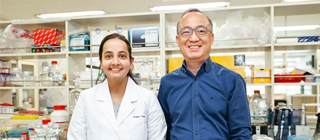
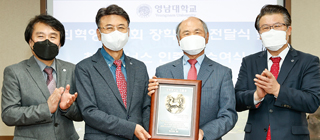
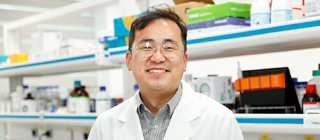
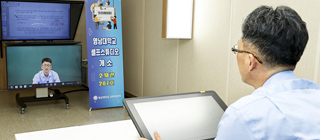
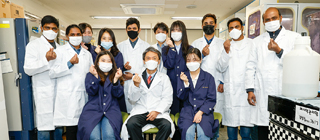
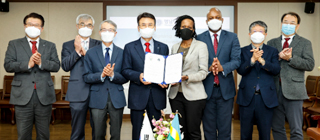
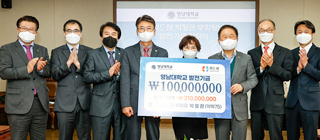
![[Global Cheonma] International Student from Malaysia Dreaming of Korea’s Development](/app/board/attach/image/thumb_33633_1617775815000.do)
